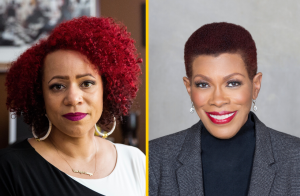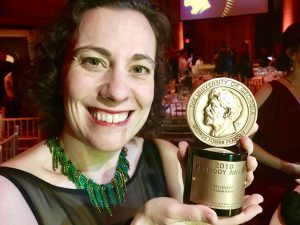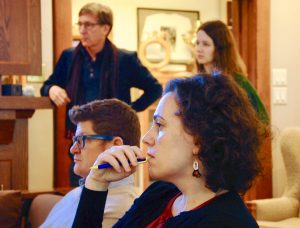 “The 1619 Project: Examining the Legacy of Slavery and the Building of a Nation” with Nikole Hannah-Jones, New York Times reporter in conversation with Rochelle Riley, Director of Arts and Culture at the Detroit Office of the Arts, Culture and Entrepreneurship
“The 1619 Project: Examining the Legacy of Slavery and the Building of a Nation” with Nikole Hannah-Jones, New York Times reporter in conversation with Rochelle Riley, Director of Arts and Culture at the Detroit Office of the Arts, Culture and Entrepreneurship
January 28, 2020 | 6 p.m.
Rackham Auditorium
915 E Washington St, Ann Arbor, MI 48109
Free and open to the public.
About the Event
Journalism is often called the first draft of history. But journalism can also be used as a powerful tool for examining history.
Four hundred years ago, in August 1619, a ship carrying enslaved Africans arrived in the English colony of Virginia, establishing the system of slavery on which the United States was built.
With The 1619 Project, The New York Times is prompting conversation and debate about the legacy of slavery and its influence over American society and culture. From mass incarceration to traffic jams, the project seeks to reframe our understanding of American history and the fight to live up to our nation’s central promise.
Wallace House Presents the project’s creator, New York Times Magazine reporter Nikole Hannah-Jones, in conversation with Rochelle Riley, longtime journalist and columnist.
1619 at Michigan
In coordination with the event, the Department of Afroamerican and African Studies at the University of Michigan sponsored five discussion sessions on the 1619 podcasts, one for each of the five episodes. Each listening session drew a larger audience than the previous and each episode drove lively, inquisitive conversations about critically important issues facing our nation.
This video, produced by Wallace House, includes some of the voices of students who attended the discussions, their perspectives on The 1619 Project and the continued relevance of the history of slavery.
About the Speaker
Nikole Hannah-Jones is a domestic correspondent for The New York Times Magazine focusing on racial injustice. She has written on federal failures to enforce the Fair Housing Act, the resegregation of American schools and policing in America. Her extensive reporting in both print and radio on the ways segregation in housing and schools is maintained through official action and policy has earned the National Magazine Award, a Peabody and a Polk Award. Her work designing “The 1619 Project” has been met with universal acclaim. The project was released in August 2019 to mark the 400th anniversary of American slavery and re-examines the role it plays in the history of the United States.
Hannah-Jones earned her bachelor’s in history and African-American studies from the University of Notre Dame and her master’s in journalism and mass communication from the University of North Carolina at Chapel Hill.
About the Moderator
Rochelle Riley was a 2007-2008 Knight-Wallace Fellow and is the Director of Arts and Culture at the Office of Arts, Culture and Entrepreneurship for the City of Detroit. For nineteen years she was a columnist at the Detroit Free Press. Riley is author of “The Burden: African Americans and the Enduring Impact of Slavery” and the upcoming “That They Lived: Twenty African Americans Who Changed The World.” She has won numerous national, state and local honors, including the 2017 Ida B. Wells Award from the National Association of Black Journalists for her outstanding efforts to make newsrooms and news coverage more accurately reflect the diversity of the communities they serve and the 2018 Detroit SPJ Lifetime Achievement Award alongside her longtime friend, Walter Middlebrook. She was a 2016 inductee into the Michigan Journalism Hall of Fame.
This is a 2020 Annual U-M Reverend Dr. Martin Luther King Jr. Symposium event.
Co-sponsors:
U-M College of Literature, Science, and the Arts
U-M Center for Social Solutions
Office of Diversity, Equity & Inclusion


